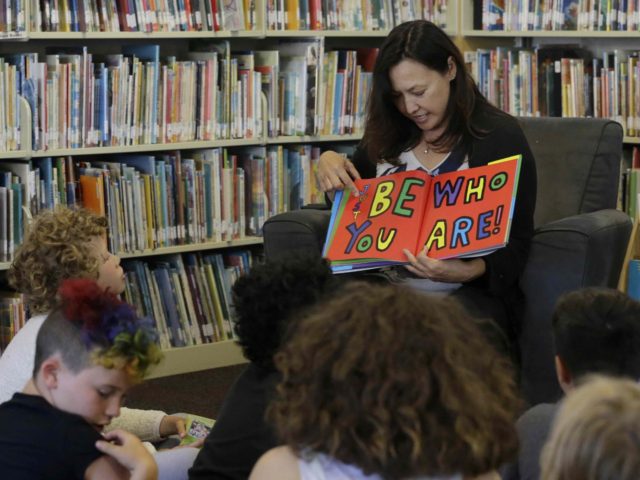Parents of kindergartners attending a California charter school are frightened after a teacher read her class a book about transgenderism without notifying them.
“My daughter came home crying and shaking so afraid she could turn into a boy,” one parent of a kindergartner at Rocklin Academy said.
“These parents feel betrayed by the school district that they were not notified,” Karen England of the Capitol Resource Institute said at a school board meeting this week, the local CBS affiliate reports. “The kindergartners came home very confused, about whether or not you can pick your gender, whether or not they really were a boy or a girl.”
According to the news report, the book was given to the teacher by a gender-confused child. Parents asserted the same kindergartner “also changed clothes and was revealed as her true gender” during class.
Parents expressed betrayal that they were not notified ahead of time that the kindergarten teacher read two books about transgenderism to her students, including I Am Jazz, which were reportedly given to her by the kindergartner who is in the midst of gender transition. The book was co-authored by Jazz Jennings, a teen who was born a boy but was allowed to transition to a girl.
“It’s really about the parents being informed and involved and giving us the choice and rights of what’s being introduced to our kids, and at what age,” said parent Chelsea McQuistan.
“I’m so proud of my students, it was never my intent to harm any students but to help them through a difficult situation,” said the kindergarten teacher during the meeting, who, according to the report, received support from her colleagues about the need to teach students about diversity.
“When we head in the direction of banned books or book lists, or selective literature– that should only be read inside or outside the classroom, I think that’s a very dangerous direction to go,” said seventh-grade teacher Kelly Bryson.
In a statement during the board meeting, the district said, “As indicated by Superintendent Robin Stout in a communication last week, staff will be engaging parents and teachers in discussions about how materials outside our curriculum will be addressed in the future.”
The board plans to put the item on the agenda for the September meeting.
In May of 2015, a similar incident occurred in Kittery Point, Maine, when public school officials apologized to parents of students in kindergarten through third grade for failing to notify them before their children were exposed to I Am Jazz during a lesson on tolerance and acceptance.
The forced gender ideology that LGBT groups advocate claims that biological sex is subordinate to self-declared “gender” and attempts to undermine the science-based civic understanding that there are two biological sexes – male and female.
“Most people have a sense of their gender identity at age 3 or 4,” Jo Michael, legislative manager at Equality California and transgender individual, told FOX40. “It’s important to note that the other students really do need to have that opportunity to engage and hear from the transgender student.”
More medical and research professionals are drawing attention, however, to the serious problems inherent in a phenomenon in which media hype and political debate are overshadowing actual questions about the health and psychological well-being of children. Concerns about puberty-blocking drugs – which are often used to delay children’s development into adults – can sterilize them even before they can understand how the deep biological impact of puberty will change their feelings about their emerging adult male or female body.
Researchers Paul Hruz, Lawrence Mayer, and Paul McHugh address the problem in a new paper titled “Growing Pains,” published at the New Atlantis.
The authors wrote:
There is strikingly little scientific understanding of important questions underlying the debates over gender identity — for instance, there is very little scientific evidence explaining why some people identify as the opposite sex, or why childhood expressions of cross-gender identification persist for some individuals and not for others. Yet notwithstanding the limited data, physicians and mental health care providers have arrived at a number of methods for treating children, adolescents, and adults with gender dysphoria.
The researchers explore the use of puberty suppression or blocking, in which a child or young adolescent with gender dysphoria is treated with hormones that prevent the normal progression of puberty.
“For parents of children with gender dysphoria, puberty suppression can appear very attractive,” they observed. “It seems like it might offer a medical solution for the anticipated confusion, anxiety, and distress by holding back the development of the most conspicuous features of their children’s biological sex.”
Nevertheless, the authors conclude the scientific evidence for puberty suppression as treatment for gender dysphoria is “thin,” and “based more on the subjective judgments of clinicians than on rigorous empirical evidence.”
“It is, in this sense, still experimental — yet it is an experiment being conducted in an uncontrolled and unsystematic manner,” they warn.
According to the Associated Press, Jennings’ mother, Jeanette, acknowledged the same, agreeing that hormone treatments were “experimental stuff.” She said, “I am messing with my kid’s body.”
Jazz began hormone blockers when she was 11 years old “to ward off male puberty” and began estrogen treatments the following year.
“I was a girl trapped in a boy’s body,” Jennings said two years ago after landing her own reality television show at TLC and scoring a deal with Johnson & Johnson to be the face of its #SeeTheRealMe campaign for Clean and Clear skincare products.

COMMENTS
Please let us know if you're having issues with commenting.